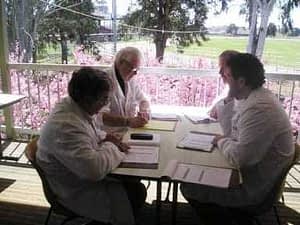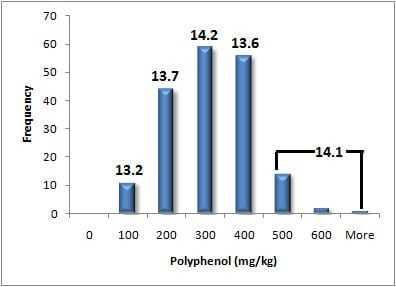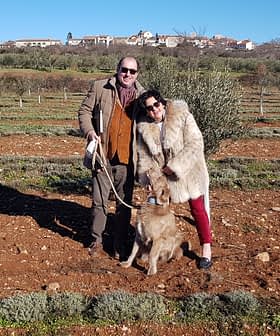By Dr. Richard Gawel
Late August marks the start of the Australian extra virgin olive oil show season. The Australian Show system comprises a group of major shows conducted under the auspices of the state Royal Agricultural and Horticultural Societies but organised by the state olive associations (Royal(s) Adelaide, Sydney, Perth, Canberra, Melbourne and Brisbane); a few small shows run by regional associations, and the Australian National organised by the Australian Olive Association. Many are in their 10th to 14th year.
The system has evolved to the point where most of them follow the same or similar protocols.
As Chairman of quite a few shows I get asked a lot of questions about their conduct. So I’ll have a go at them below.
What makes a good show judge? Good judges obviously need good sensory skills. They also need to understand and be receptive to the diversity of flavors and styles that can be encountered when judging. The ability to work constructively with other judges is also an important requirement. Judges must be willing to weigh up the opinions of their colleagues against their own.
If a person enters an oil in a show does that preclude them from being a judge? No it doesn’t. The organisers invite the most experienced judges whenever possible.
If an exhibitor is present as a judge, then doesn’t that mean that they judge their own oil? Absolutely not. This is how it works. The exhibits are divided into previously published groups called classes. While the classes are in place so that ‘like’ oils are judged together, it also helps when dividing up the oils for judging purposes.
In the event that a judge is also an exhibitor they are always allocated to a class in which their oil is not represented. No exceptions ever! Furthermore, judges are forbidden to communicate with judges from other panels until the judging has concluded and the results have been officially submitted. It’s also worth pointing out that at International shows like the Los Angeles International, judges do not judge oils entered from their country.
Imagine being a judge who has entered an oil in the show. You are sitting down judging a set of oils with a couple of other judges. Over the other side of the room somewhere, and at some point during the day, your oil will come out amongst a set of 20 or 30 others all served up in tasting glasses identified only with random codes. It will be scored by three other judges. Each judging team does their job, talking to no-one until all their results are safely in the hands of the steward.
As an aside…. I calculated the median score given to oils in last year’s Australian National Show which their producer was present as a judge vs when they were not. And the results were….
Judge not present = 14.0 Bronze: Judge present = 14.0 Bronze.
The distributions in scores also didn’t differ.* None of this was surprising as judges don’t have anything to do with their own oils. Someone else judges them.
If a judge is an exhibitor and their oil is a candidate for the best of show, then surely they can influence the outcome? Again, no they can’t. While all the judges are initially invited to assess the oils for best of show, in the event that a judge has an interest in a candidate oil, their entire score sheet is discarded prior to the evaluations being tallied. Yep trashed.
So why bother with allowing them to taste the oils for best of show in the first place if you are just going to discard their evaluation sheet? It’s the fairest way if doing it. Think about it for a moment. If the other judges were made aware that a judge had been precluded then it could potentially bias the opinions of the eligible judges as they would know that one of the candidate oils was produced by the precluded judge.
Do judges favour one style of oil over another? Any judge that announces that they have a style preference will have a very short judging career! Good judges appreciate and understand the diversity in extra virgin olive oils. Here are the results from last years Australian National Show with the oils grouped based on polyphenols level (i.e. 0 – 100, 101 – 200, 201 – 300 mg/kg etc), with the average scores given in black above each bar. The polyphenols level is a very good indicator of the robustness of an oil. Low polyphenols = mild gentle oil and High polyphenols = bitter/peppery oil. The results speak for themselves. While there are some differences between groups, the differences are not systematic. The most robust oils (> 500 mg/kg) had an almost identical average score to the medio style oils which came in between 200 and 300 mg/kg of polyphenols.
Do Australian judges get paid for judging? No, they don’t. In addition to freely giving their time and skills they also cover their own travel and accommodation costs in most cases. Hopefully this onerous situation
will change in the future.
If I wanted to see for myself how a show was conducted, could I? Absolutely. In the shows in which I preside, interested observers are welcome to quietly view proceedings and ask questions of me at any time.
* for the statistical geeks. chi squared = 2.12, p=0.549 not significant.
.
.This article was reproduced with permission.
.
Richard Gawel has been a long time appointee as Presiding Judge of most of the major olive oil shows including the Royal Adelaide, Royal Perth, Royal Canberra and the Australian National Show, and internationally at the New Zealand National and Los Angeles International Extra Virgin olive oil shows. Mr. Gawel headed Australia’s first International Olive Council recognized export tasting panel since its inception in 1997 until 2006, and regularly conducts nation-wide industry seminars and workshops in basic and advanced olive oil tasting, blending, and olive oil show judging. A member of Technical committee of the Australian Olive Association, he has published a number of scientific papers on olive oil assessment and acts as a consultant taster and blender for a number of Australian olive oil companies. Slick Extra Virgin is Mr. Gawel’s blog.










